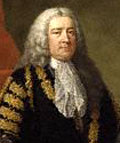Henry Pelham was the son of a long-serving MP, Thomas, 1st Baron Pelham, and younger brother of the Duke of Newcastle. He studied at Hart Hall, Oxford, and was first elected to Parliament in 1717. He became a minister in 1720, and was a close ally of Sir Robert Walpole. Pelham was influential as a mediator between Walpole and Newcastle, and persuaded his brother not to resign from Walpole's government in 1741 over the Spanish war. He refused to take over from Walpole in 1742, but was appointed First Lord of the Treasury after Earl of Wilmington's death the following year. He remained in office for over 10 years, partly due to his ability to unite different political factions in a 'broad-bottom' Government, and was the only Member of the House of Commons in his Cabinet. His premiership saw attempts at social and fiscal reform, not all of which were successful. On 11 Feb 1746 Pelham and most of the Cabinet resigned upon learning that the King wanted to replace him with the Earls of Granville and Bath. Pelham and his colleagues were reinstated three days later since Granville and Bath were unable to form a ministry. In Scotland, Bonnie Prince Charlie's Jacobite Rebellion of 1745 was put down. In foreign affairs, the War of the Austrian Succession was concluded (Treaty of Aix-la-Chapelle, 18 Oct 1748) bringing peace with France and trade with Spain. Pelham's health suffered from 1748 on, and he tried to retire in 1751, only to be dissuaded by the King. He died in office in 1754. Biography source: [1, pp. 11-15] |

